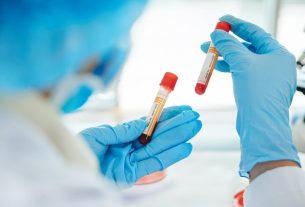The proteins troponin T and troponin I are released into the blood when there is damage to the heart muscle, such as when a heart attack occurs, for example. This means that having a test to assess the amount of troponins in the blood is a good way to identify whether someone may have a heart injury.
In healthy people, the troponin test normally does not identify the presence of these proteins in the blood, and a normal result is considered when the result is negative or non-reactive. Normal troponin values can vary depending on the test performed by the laboratory, but are generally less than 0.04 ng/mL for troponin I and 0.01 ng/mL for troponin T.
In some cases, this exam may also be ordered with other blood tests, such as myoglobin or creatine phosphokinase (CPK), which also help in diagnosing heart problems. Understand what the CPK exam is for.

What is the exam for?
This exam is normally ordered by the doctor when there is a suspicion that a heart attack has occurred, such as when symptoms such as severe chest pain, difficulty breathing or tingling in the left arm appear, for example. In these cases, the exam is usually repeated 3 and 6 hours after the first test. Check out other signs that may indicate a heart attack.
Troponin is the main biochemical marker used to confirm a heart attack. Its concentration in the blood begins to rise 4 to 8 hours after the heart attack and returns to normal concentration after about 10 days, which can indicate to the doctor when the heart attack occurred. Despite being the main marker of heart attack, troponin is normally measured together with other markers, such as CK-MB and myoglobin, whose concentration in the blood begins to increase 1 hour after the heart attack. Find out more about the myoglobin test.
The troponin test may also be requested due to other causes of heart damage, as in cases of angina that worsen over time, but which do not present symptoms of a heart attack.
Is preparation necessary for the exam?
For this type of clinical analysis, no preparation is necessary, such as fasting or avoiding medications.
Reference values
Normal troponin values in a healthy person are generally:
- Troponin I: 0.0 to 0.04 ng/mL
- Troponin T: 0.0 to 0.01 ng/mL
However, reference values may vary depending on the test performed by the laboratory.
What does the result mean
The result of the troponin test in healthy people is negative or non-reactive, as the amount of proteins released into the blood is very low, being little or not detected. If the result is negative 12 to 18 hours after heart pain, it is unlikely that it was due to a heart attack, with other causes such as excess gas or digestive problems being more likely. Check out the main causes of heart pain.
However, when the result is positive, it may indicate an injury or change in cardiac functioning and although very high values generally occur when there is a heart attack, intermediate values may indicate other problems such as:
- Very fast heartbeat;
- High blood pressure in the lungs;
- Lung embolism;
- Congestive heart failure;
- Inflammation of the heart muscle;
- Trauma caused by traffic accidents;
- Chronic kidney disease.
Troponin values in the blood remain altered for about 10 days and can be evaluated over time to ensure that the injury is being treated correctly.
See which tests allow you to assess heart health.
Bibliography
- GARG, Pankaj et al. Cardiac biomarkers of acute coronary syndrome: from history to high-sensitivity cardiac troponin. Internal Emerg Med. Vol.12, n.2. 147–155, 2017
- STATPEARLS. Myocardial Infarction. 2022. Available at: <https://www.ncbi.nlm.nih.gov/books/NBK537076/>. Accessed on Aug 5, 2022
- AMERICAN BOARD OF INTERNAL MEDICINE. ABIM Laboratory Test Reference Ranges ̶ January 2022. Available at: <https://www.abim.org/Media/bfijryql/laboratory-reference-ranges.pdf>. Accessed on Aug 5, 2022
- SANDOVAL, Yader et al. High-Sensitivity Cardiac Troponin and the 2021 AHA/ACC/ASE/CHEST/SAEM/SCCT/SCMR Guidelines for the Evaluation and Diagnosis of Acute Chest Pain. Circulation. Vol.0, n.10. 2022
- STATPEARLS. Troponin. 2022. Available at: <https://www.ncbi.nlm.nih.gov/books/NBK507805/>. Accessed on Aug 5, 2022

Sign up for our newsletter and stay up to date with exclusive news
that can transform your routine!
Warning: Undefined array key "title" in /home/storelat/public_html/wp-content/plugins/link-whisper-premium/templates/frontend/related-posts.php on line 12
Warning: Undefined array key "title_tag" in /home/storelat/public_html/wp-content/plugins/link-whisper-premium/templates/frontend/related-posts.php on line 13



